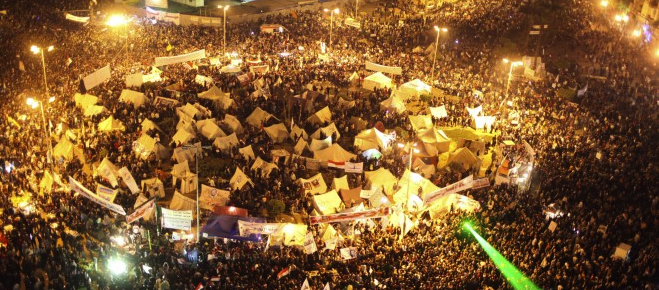Egypt: A state of hope, unravelled
With the economy in turmoil, protesters in Cairo’s Tahrir Square call for change once again
Anti-Mursi protesters chant anti-government slogans in Tahrir Square in Cairo November 27, 2012. Tens of thousands Egyptians protested on Tuesday against President Mohamed Mursi in one of the biggest rallies since Hosni Mubarak’s overthrow, accusing the Islamist leader of seeking to impose a new era of autocracy. REUTERS/Asmaa Waguih (EGYPT – Tags: CIVIL UNREST POLITICS)
Share

It was a scene rich with irony. In Cairo’s Tahrir Square, where two years ago protesters forced the departure of the military-backed president Hosni Mubarak, an even larger crowd calling for the departure of Egypt’s elected president Mohamed Morsi celebrated as the military implicitly threatened to oust him.
Morsi, from the Islamist Muslim Brotherhood, took the presidency last June after Egypt’s first genuinely free vote. The Brotherhood’s ascension to power after decades in which they were banned worried Egyptian liberals and secularists. Those fears grew as Egypt’s new government passed a vaguely worded constitution that, its opponents alleged, allowed for the creeping Islamization of the Egyptian state.
The economy nosedived. Law and order unravelled. But Morsi still has many supporters, and they too took to the streets this week as rival protests paralyzed the country. The Muslim Brotherhood’s headquarters were ransacked and burned. At least seven people died. Six government ministers resigned. On Monday the army said the government and opposition had 48 hours to reach an agreement or it would intervene—exactly how was unclear.
Morsi vowed to stick to his own plans for “national reconciliation.” Muslim Brotherhood supporters donned hard hats and took up clubs. Last fall, Mohamed el-Beltagy, a leading member of the Brotherhood’s Freedom and Justice Party, told Maclean’s the government needed to deliver results quickly to preserve “this state of hope.” In a Tuesday Facebook post he said: “Preventing this coup may call for martyrdom.” Rarely have the religious and social divides that run through the Arab Middle East been so starkly defined.